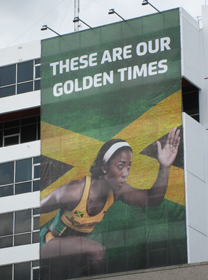By Dania Bogle in Kingston
Back to business - the next 50 years await.
That seemed to be the message as Jamaicans moved beyond their Golden Jubilee of Independence celebrations in August and the euphoric high of a record medal haul at the 2012 London Olympics.
“I’m tired. Tomorrow is work,” attorney-at-law Alayne Bennett, who took time off from work to watch the Olympics, told Caribbean Intelligence© a few hours after the closing ceremony.
The period of celebration which began on 1 August, Emancipation Day, ended on 12 August as the Jamaican quartet of Usain Bolt, Yohan Blake, Nesta Carter and Michael Frater came home in a world record 36.84 seconds to win the men’s 4x100m.
Back to the challenges
The masses who piled into the streets over the nine days of track and field competition dispersed and went on with life as usual and back to the business of making ends meet in a tight economy compounded by a global recession.
Alayne Bennett summed up the general feeling on what Jamaica needs going forward: “We need to focus on putting the necessary infrastructure in place, we need a new stadium. We can’t just keep on running on raw talent.
“We need leadership. The population needs to be re-educated. We have lost our way.
“We have too much indiscipline. Common decency is lacking and for that we need to go back and start teaching people. I would go back and start imposing prison terms for some things. The society is that bad.”
Seaga - Fix the basics
Two former prime ministers of Jamaica, Edward Seaga and PJ Patterson, have differing views on the progress that the Caribbean island of 2.8 million people has made since Independence Day - 6 August 1962.
Mr Patterson said the country had made progress in basic human rights such as maternity leave for women, equal pay, press freedom and greater access to tertiary level education.
Mr Seaga contended that, except for tourism and sport, there was not much worth celebrating in 50 years of complete self-governance.
“If we don’t fix the fundamental problems that we experienced in the last 50 years, then the next 50 will be equally affected to the detriment of the economy and society,” Mr Seaga told Caribbean Intelligence©.
He said those problems were a low literacy rate, the exchange rate and the tightening of regulations of the charter of rights to make it more effective.
Mr Seaga added that the criminal justice system, education and the economy were key concerns as Jamaica moved forward.
Economic concerns
The state of the economy is certainly a key factor which has contributed to the migration of many of Jamaica’s youngest and brightest minds.
One Jamaican-born Brit, Tamara Short-Smith, 36, migrated to the United Kingdom over a decade ago and now has young children who were born in England.
She told Caribbean Intelligence© that she would love to return to Jamaica, but that she would need to see a few changes before being able to do so.
“Money to start with. When you go overseas, it is only for economic reasons,” she said.
“[Money is] the only reason I stay in this cold and lonely place. The pull factor would be a house, a car and a stable income. [It] don’t have to be lottery winnings, but money to buy non-essential things, and with the kids, just being able to pay for good schooling and to keep them entertained.”
Pothole free?
Jamaica’s Education Ministry expressed disappointment that the pass rate for 22 subjects at the Caribbean Secondary Examination Certificate (CSEC) has fallen from 69.3% in 2010 to 61.8% this year.
A day after the Olympics ended, the executive director of the National Integrity Action, Trevor Munroe, was calling for a meeting of the relevant bodies to find a way to unify the country, to address the economic and social crisis which Jamaica faces.
While the horizon seems dim for many, one local beer manufacturer ran a series of advertisements during the independence period about what Jamaica would be like 50 years from now.
One of the highlights was that in 2062, Jamaica would finally be pothole-free.
A pretty telling tale indeed.
